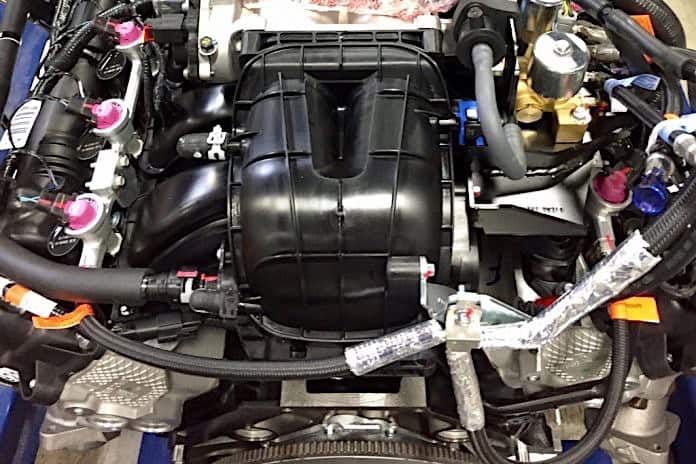ROUSH CleanTech has its sights set on reaching an even lower emissions level as it celebrates the development of the first and only propane-autogas engine available for class 4 through class 7 vehicles that meets the optional 0.05 grams per brake horsepower per hour (g/bhp-hr) for oxides of nitrogen (NOx).
Last month, the California Air Resources Board (CARB) certified ROUSH CleanTech’s 6.8L V10 3V propane engines for school bus and commercial trucks to 0.05 g/bhp.hr, which is 75 percent cleaner than the U.S. EPA’s base standard of 0.20 grams of NOx. ROUSH added that it has begun installing the new low NOx engines in its Ford commercial vehicles and Blue Bird Vision propane school buses powered by 2017 model-year engines.
Todd Mouw, vice president of ROUSH CleanTech’s sales and marketing efforts, said in a statement that the news fits well with new available funds that target further NOx reductions starting later this year.
“Our 0.05g NOx engine certification will help our school bus and public transit customers target funds from the upcoming VW Environmental Mitigation Trust program,” said Mouw. “This is especially beneficial for school districts looking for extra funds to replace aging diesel models.”
Watch a recorded STN webinar on the VW Mitigation Trust Fund
But ROUSH is not stopping. Just prior to receiving CARB approval, Mouw told STN at the Advanced Clean Energy EXPO in Long Beach, California that the company expects to meet the even cleaner optional low NOx standard of 0.02 g/bhp-hr sometime in 2018. Meeting the lower level likely will mean engine catalyst changes that could result in some incremental upfront purchase price increases, he said on May 3 at the Long Beach Convention Center. But, he added, other engine manufacturers have already had to make larger, costly infrastructure investments simply to reach 0.05 g/bhp-pr, while ROUSH met that mark through software re-calibrations that didn’t result in pass-through costs to customers.
The goal is to include propane in the conversation of achieving zero-emissions, Mouw explained, especially amid news this spring that production of renewable propane, which is derived from vegetable oils and is a by-product of renewable diesel, matures in California and outperforms traditional propane as well as other alternative fuels in reducing greenhouse gas (GHG) emissions. In a letter to CARB in April, Western Gas Association president Joy Alafia wrote that renewable propane reduces GHGs by 84 percent over conventional fuels, while virtually eliminating particulate matter emissions and lowering levels of carbon monoxide and NOx.
“There’s a pathway there for renewable propane. Now, I think part of the initial issue is trying to figure out what does the dollar value look like?” Mouw said. He added that questions also remain on the availability of the clean-burning fuel. One option is NESTE, the Finnish company that is the largest producer of renewable fuels in the world.
Meanwhile, Mouw said regular propane production is increasing domestically. With 600 million new gallons available, opportunities exist to expand the current market of 650 school districts nationwide currently operating about 12,000 newer-generation, propane-autogas school buses. That means proane only powers about 3 percent of the nation’s school buses, and more than 80 percent of the nation’s school districts exist as potential new customers for 3,000 propane suppliers across the U.S. But only a handful of those companies are currently involved in selling propane as a transportation fuel.
Amid all this is a stop-gap, as Mouw described, toward more propane school bus acceptance. That is the re-emergence of gasoline, which operates under the same drivetrain environment and requires similar maintenance while also offering a lower price point. It also does not require fleet operators to have an understanding of more complex diesel systems.
“If (school bus operators) are not ready to jump to propane and familiar with gasoline engines in the white part of their fleet, it should help make that transition easy,” he added.














